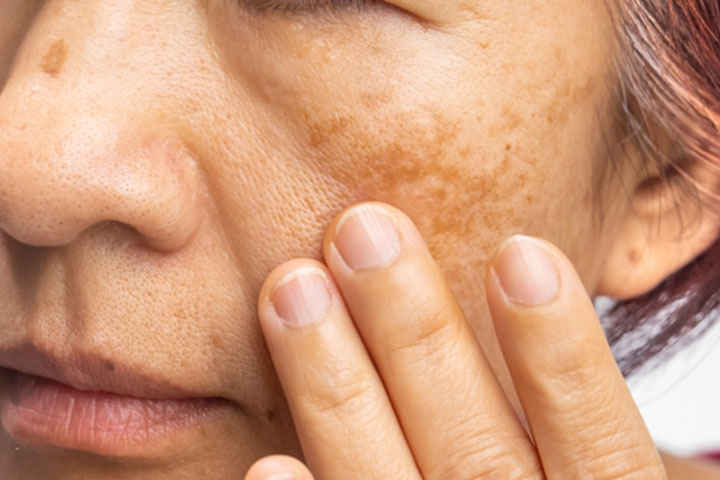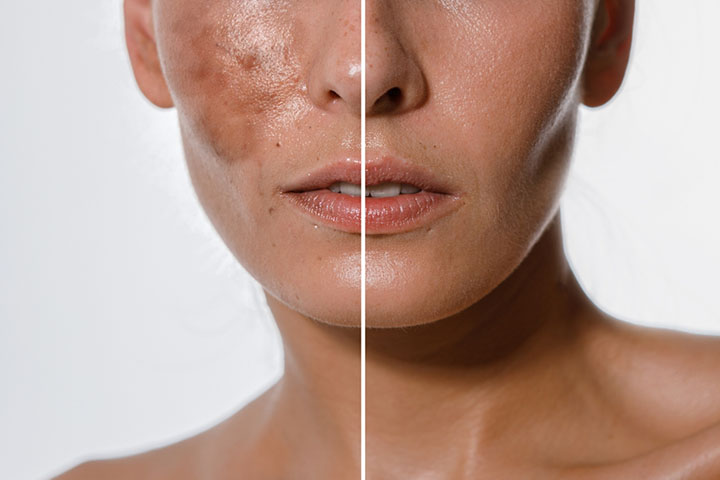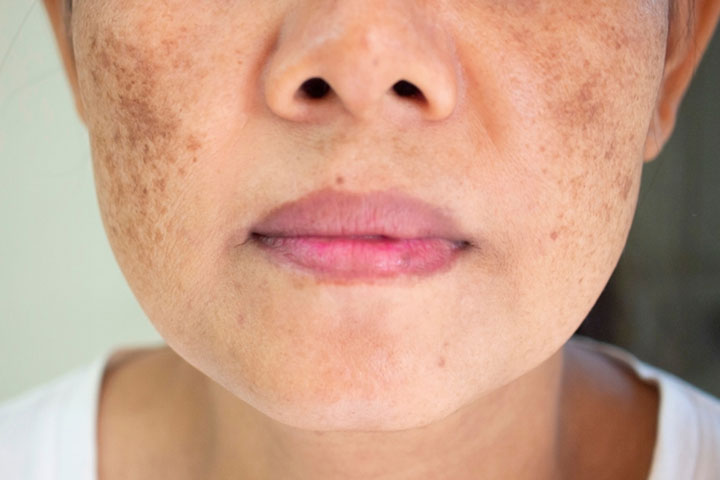
Image: Shutterstock
Pregnancy is a beautiful journey filled with numerous changes, both physical and emotional. One of the common changes that some expectant mothers may experience is skin darkening, particularly in the form of melasma or chloasma. In this article, we will explore what melasma is, whether it is normal to have melasma during pregnancy, what causes it and how to prevent it from worsening. We will also go over whether it will stay after pregnancy, if skin darkening during pregnancy is a sign of illness, and when to seek help. Read on to know more!
What Is Melasma?
Image: Shutterstock
During pregnancy, hormonal changes can bring about melasma, also called chloasma or the “mask of pregnancy.” Dark patches or hyperpigmentation appear on the face, typically on the cheeks, forehead, upper lip, and chin. Understanding the causes and treatments of melasma can help you manage this temporary skin condition with confidence.
Is It Normal To Have Melasma During Pregnancy?
Image: Shutterstock
Pregnancy brings melasma to the stage for many women, with 50-70% experiencing its effects (1). Hormonal fluctuations, particularly elevated estrogen and progesterone, trigger the appearance of dark patches (2). Sun exposure adds to the spotlight, making them more prominent. Stay prepared by understanding the hormonal cues and protecting yourself from the sun’s rays during this transformative journey.
What Causes Melasma?
Image: Shutterstock
1. Sun Exposure
Sun exposure is a significant culprit behind melasma. When the skin is exposed to prolonged sunlight, the melanocytes, responsible for melanin production, go into overdrive, resulting in the formation of dark patches. Surprisingly, even minimal sun exposure can trigger melasma in those prone to the condition.
2. Genetic Predisposition
Some women may have a genetic predisposition to melasma, making them more susceptible to developing the condition during pregnancy. If your mother or grandmother experienced melasma during their pregnancies, you may have a higher likelihood of developing it as well.
3. Hormonal Contraceptives
Estrogen-containing oral contraceptives or hormone replacement therapies raise the risk of melasma. These hormonal changes disturb the melanin production balance, making the skin more vulnerable to darkening when exposed to sunlight. If you’re considering hormonal contraceptives or replacement therapy, consult your healthcare provider to discuss potential risks and alternative options.
How To Prevent Melasma From Getting Worse?
Image: Shutterstock
1. Sun Protection
Shielding your skin from the sun’s harmful rays is crucial in managing and preventing melasma from worsening. To protect your skin, wear wide-brimmed hats, sunglasses, and protective clothing that covers your arms and legs. Additionally, use a broad-spectrum sunscreen with a high sun protection factor (SPF) of 30 or above.
2. Gentle Skincare
Adopting a gentle skincare routine can help minimize irritation and prevent the worsening of melasma. Use mild cleansers that do not strip away natural oils from the skin. Harsh scrubs or exfoliants can exacerbate melasma, so it is best to avoid them. Instead, opt for gentle, non-irritating skincare products that are specifically formulated for sensitive skin.
3. Makeup And Concealers
If melasma makes you self-conscious, there’s good news! Makeup and concealers can come to the rescue, helping to hide those dark patches. Look for products specifically formulated to address hyperpigmentation. Opt for makeup that offers good coverage while being gentle on your skin and doesn’t clog your pores. To make the best choices, consider seeking advice from a dermatologist or makeup specialist who can guide you towards suitable options based on your unique skin type.
Will Melasma Stay Even After Pregnancy?
Image: Shutterstock
In many cases, melasma gradually fades after childbirth as hormonal levels stabilize. However, it is important to note that melasma can persist for an extended period, and in some cases, it may never completely disappear. Continual sun protection and appropriate skincare can help manage the condition and minimize its appearance.
Is Skin Darkening During Pregnancy A Sign Of Illness?
In most cases, skin darkening during pregnancy, including melasma, is not a sign of illness. However, it is essential to consult with your healthcare provider to rule out any underlying medical conditions that may present similar symptoms. They can provide a proper diagnosis and guide you accordingly.
When To Seek Help?
Image: Shutterstock
While melasma is generally a harmless condition, there are situations where you should seek professional help:
1. Severe Psychological Distress
If you are experiencing significant emotional distress or a negative impact on your self-esteem due to melasma, you should reach out to a dermatologist or mental health professional.
2. Unusual Symptoms
If you notice any irregular changes in the appearance of the patches, such as bleeding, itching, or rapid growth, consult a healthcare professional.
While melasma may impact a woman’s self-confidence, understanding its causes and implementing preventive measures can help effectively manage it. By prioritizing sun protection, practicing gentle skincare, and seeking guidance from your healthcare provider, you can navigate through this temporary skin condition with confidence and support. Remember, every pregnancy journey is unique, and sharing your experiences with melasma can create a supportive community. We invite you to share your stories and insights in the comments below!


















